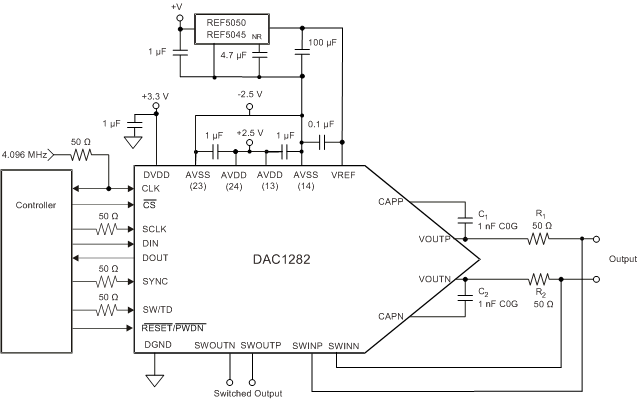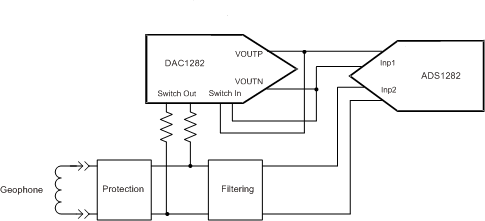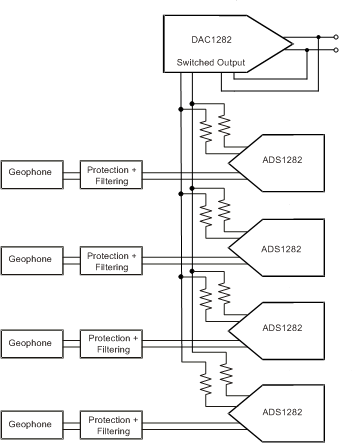SBAS490B December 2011 – May 2015 DAC1282
PRODUCTION DATA.
- 1 Features
- 2 Applications
- 3 Description
- 4 Revision History
- 5 Device Comparison
- 6 Pin Configuration and Functions
- 7 Specifications
-
8 Detailed Description
- 8.1 Overview
- 8.2
Feature Description
- 8.2.1 Signal Output (VOUTP, VOUTN)
- 8.2.2 DAC Modes
- 8.2.3 Reference Voltage (VREF)
- 8.2.4 Output Filter (CAPP, CAPN)
- 8.2.5 Output Switch (SWINP, SWINN, SWOUTP, SWOUTN)
- 8.2.6 Clock Input (CLK)
- 8.2.7 Switch Control/External Digital Input (SW/TD)
- 8.2.8 SYNC
- 8.2.9 RESET/PWDN
- 8.2.10 AVDD, AVSS, and DVDD Power Supplies
- 8.2.11 Step Response
- 8.2.12 Frequency Response
- 8.3 Device Functional Modes
- 8.4 Programming
- 8.5 Register Map
- 9 Application and Implementation
- 10Device and Documentation Support
- 11Mechanical, Packaging, and Orderable Information
9 Application and Implementation
NOTE
Information in the following applications sections is not part of the TI component specification, and TI does not warrant its accuracy or completeness. TI’s customers are responsible for determining suitability of components for their purposes. Customers should validate and test their design implementation to confirm system functionality.
9.1 Application Information
Figure 50 shows the basic DAC1282 connection. Bipolar analog supplies are shown (±2.5 V). Single-supply operation is also possible with AVDD = 5 V and AVSS = GND. The digital supply range is 1.65 V to 3.6 V.
A low-noise, low-drift reference is recommended for best performance, such as the REF5050 (+5 V) and REF5045 (+4.5 V). Best signal-to-noise ratio is achieved with a 5-V reference, although a 4.5-V reference (REF5045) can be used with 1-dB loss in SNR. The 4.5-V reference can be operated from a 5-V supply. AVSS (pin 14) is the key reference ground point and should be connected to the reference ground terminal using a star connection. C1 and C2 are the required 1-nF output filter capacitors. The capacitors should be of the low volt-coefficient type (such as a COG ceramic or similar) and placed close to the device pins. Output resistors, R1 and R2, decouple the DAC to ensure best performnace when driving capacitive loads. The output is shown routed to the signal switch, providing a second, switched DAC output.
 Figure 50. Basic Connection
Figure 50. Basic Connection
9.2 Typical Applications
9.2.1 Single-Channel Seismic System
Figure 51 illustrates a single-channel data acquisition concept for seismic. The DAC1282 is used to test both the ADC and geophone. The DAC1282 connects directly to channel 1 of the ADC. Tests of the ADC include THD, pulse, input noise, common-mode, etc. The DAC output and ADC sample timing are controlled by the SYNC input pins.
The geophone connects to channel 2 of the ADC through input protection and optional filter networks. The DAC connects to the geophone using the integrated signal switch. Series resistors isolate the geophone from the DAC output. Geophone test capabilities include impulse, THD, leakage, and common-mode.
 Figure 51. Single-Channel Seismic System
Figure 51. Single-Channel Seismic System
9.2.2 Four-Channel Seismic System
Figure 52 illustrates a four-channel system. The switched DAC1282 output is routed to the ADC inputs. The signal from the DAC switch is used to perform sensor impulse testing by opening the switch while digitizing the response.
 Figure 52. Four-Channel Seismic System
Figure 52. Four-Channel Seismic System